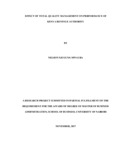| dc.description.abstract | The long term success of organizations in an ever-changing global economy is dependent on improvement of the efficiency in quality performance of such in order to increase customers’ level of satisfaction.The growing globalization of businesses make them to consider creating a cohesive approach of sustaining success in modern global markets by integrating workers and implementing development programs that will promote productivity and business performance. In strategic planning the need to identify a corporate strategy that will ensure that an organization does not only meet its goals and objectives, but it is also able to respond to the environment within which it operates cannot be overemphasized. Total Quality Management impacts the creation of systems in an organization that help in learning, cooperation and facilitating the implementation of different management practices to ensure performance is enhanced. In an effort to improve efficiency, KRA has to embrace TQM principles which include effective implementation of management leadership, strategic planning, engaging training programs and ensuring knowledge and process management which will play an important role in the improvement of performance. The study aimed at establishing the effect of Total Quality Management on performance of Kenya Revenue Authority. The study was directed by Deming’s theory of profound knowledge and Kanter Model of Change Management. A case study was used in study. Data was gathered using an interview guide which was administered to senior managers of Kenya Revenue Authority or their equivalent. The study used content analysis method to analyze the data which was collected. The study concluded that the reforms, modernization and changes in quality systems at KRA have been effective on streamlining revenue collection in Kenya. This has been boosted by reduced clearance times and increasing revenue collection. On operational efficiency the study concludes that Total Quality Management policies have brought positive paybacks due to effective KRA management. The study further concludes that staff training and development has enhanced employees’ knowledge, skills and professional capacity. The study recommends that more training and education on modernization and reforms at KRA should be offered so as to promote professional capacity, knowledge and skills held by employees. The researcher faced difficulties in getting or accessing confidential business information from concerned employees due to fear of incrimination from management executives. To overcome these, the researcher had to assure the sampled respondents on the confidentiality of the information collected and no names divulged in the final report. To obtain a deeper understanding of the level of implementation of Total Quality Management policies and the hitches of implementing Total Quality Management policies, in-depth interviews should be conducted with other stakeholders of designated organizations who are directly affected by the implementation of the policies. This study was carried out in Kenya Revenue Authority which is a state corporation, future studies should be carried out in the financial sector of the private sector. | en_US |



